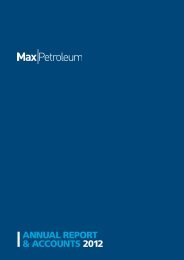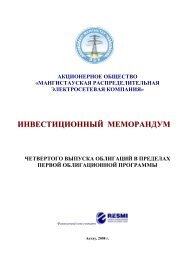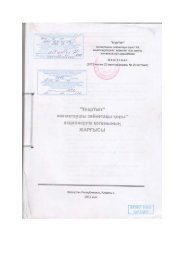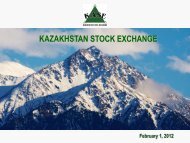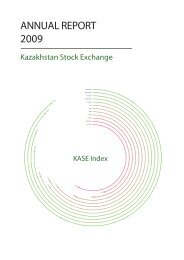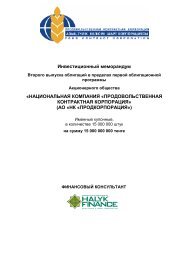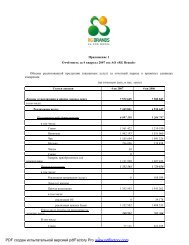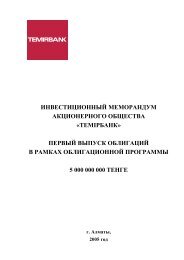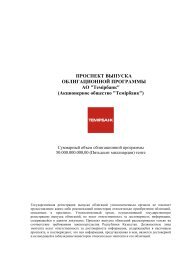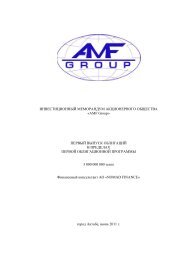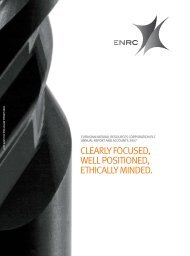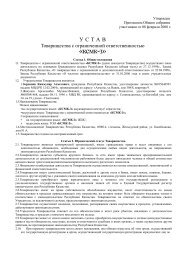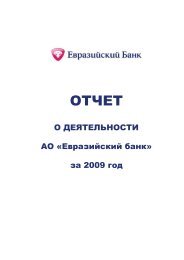JPMorgan - KASE
JPMorgan - KASE
JPMorgan - KASE
You also want an ePaper? Increase the reach of your titles
YUMPU automatically turns print PDFs into web optimized ePapers that Google loves.
Hurricane, HKM, HOP and the issuer and certain experts named herein reside outside the United<br />
States and most of their assets are located outside the United States. As a result, it may be<br />
difficult for investors to effect service of process within the United States upon Hurricane, HKM,<br />
HOP or the issuer or such persons with respect to matters arising under U.S. federal securities<br />
laws, or to enforce judgments of courts of the United States against them whether or not<br />
predicated upon the civil liability provisions of the federal securities or other laws of the United<br />
States or any state thereof. There is substantial doubt as to the enforceability in Canada,<br />
Kazakhstan and the Netherlands against Hurricane, HKM, HOP or the issuer or any of their<br />
respective directors and executive officers or experts named herein, in original actions or in<br />
actions for enforcement of judgments rendered by U.S. courts, of liabilities predicated solely on<br />
the anti-fraud provisions of the U.S. federal securities laws. Hurricane, HKM, HOP and the issuer<br />
will irrevocably submit to the non-exclusive jurisdiction of any State of New York or U.S. federal<br />
court sitting in the City of New York with respect to any suit, action or proceeding with respect<br />
to the indenture, the notes or the guarantees and for any actions brought under U.S. federal or<br />
State securities laws. See “Description of the Notes — Governing Law; Consent to Jurisdiction and<br />
Service; Arbitration.”<br />
The notes and the indenture relating to the notes are governed by the laws of the State of New York<br />
and the issuer and the guarantors have agreed in the notes and the indenture that disputes arising<br />
thereunder are subject to the jurisdiction of the courts of the State of New York or, at the election of<br />
the trustee or, in certain circumstances, a noteholder, to arbitration in London, England. See<br />
“Description of the Notes — Governing Law; Consent to Jurisdiction and Service; Arbitration.”<br />
Kazakhstan’s courts will not enforce any judgment obtained in a court established in a country other<br />
than Kazakhstan unless there is in effect a treaty between such country and Kazakhstan providing for<br />
reciprocal enforcement of judgments and then only in accordance with the terms of such treaty. There<br />
is no such treaty in effect between Kazakhstan and the United States. The indenture will provide that,<br />
at the option of any holder of a note, any dispute or difference of whatever nature however arising<br />
under, out of or in connection with the indenture, the notes and/or the guarantees held by such holder,<br />
may be referred to and finally resolved by arbitration under the Rules of the London Court of<br />
International Arbitration (the “Rules”). Each of Kazakhstan and the United States are parties to the<br />
1958 New York Convention on Recognition and Enforcement of Arbitral Awards (the ‘‘Convention’’).<br />
There has recently been some doubt as to whether the courts of Kazakhstan would enforce an arbitral<br />
award under the Convention. In February 2002, the Constitutional Council of Kazakhstan passed a<br />
decree on the interpretation of the Kazakhstan Constitution which stated that the conclusion by parties<br />
to a commercial contract in connection with which a dispute is submitted for consideration to<br />
arbitration should not exclude the possibility that such dispute may be considered by the courts of<br />
Kazakhstan. The decree made no distinction between foreign and domestic arbitral awards. However in<br />
April 2002, the Constitutional Council of Kazakhstan passed a further decree stating that the original<br />
decree did not apply to the recognition and enforcement of foreign arbitration awards where the<br />
procedure for such awards is established by a treaty obligation of Kazakhstan. Accordingly, arbitration<br />
awards under the Rules are generally recognized and enforceable in Kazakhstan provided the<br />
conditions to enforcement set out in the Convention are met.<br />
In addition, the issuer is incorporated under the laws of the Netherlands. The United States and the<br />
Netherlands do not currently have a treaty providing for reciprocal recognition and enforcement of<br />
judgments (other than arbitration awards) in civil and commercial matters. Therefore, a final judgment<br />
for the payment of money rendered by any federal or state court in the United States based on civil<br />
liability, whether or not predicted solely upon United States federal securities laws, would not be<br />
directly enforceable in the Netherlands. However, if the party in whose favor such final judgment is<br />
rendered brings a new suit in a competent court in the Netherlands such party may submit to a Dutch<br />
court the final judgment, which has been rendered in the United States. If the Dutch court finds that<br />
the jurisdiction of the federal or state court in the United States has been based on a valid submission<br />
by the issuer to the jurisdiction of such courts and that proper legal procedures have been observed, the<br />
Dutch court will, in principle, give binding effect to the final judgment which has been rendered in the<br />
United States unless such judgment contravenes public policy in the Netherlands. It is uncertain whether<br />
such practice extends to default judgments as well.<br />
v



